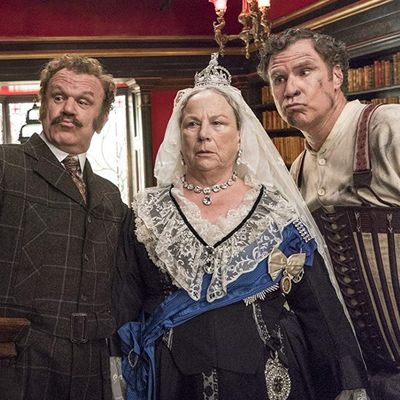
One of the year’s most critically shellacked movies (the pros were forced to watch it in theaters on Christmas Day alongside the common hordes), Holmes & Watson begins as ineptly as any comedy I’ve seen, and then settles into an agreeably silly groove that had the common hordes around me yukking it up. When it’s bad it is, indeed, painful, but even third-rate Will Ferrell + John C. Reilly is more inspired than the noisy contraptions on either side of it in the multiplex.
The twist is to make Sherlock Holmes, Arthur Conan Doyle’s pillar of 19th-century rationalism, into the latest of Ferrell’s posturing child-men, another symbol of the patriarchy’s dimming light. After being tricked by grade-school classmates into kissing the arse of an ass when he thought he’d be kissing a girl, Holmes purges himself of emotion and becomes a giant brain doling out punishments to those who would underestimate his powers of ratiocination. Those powers in Holmes & Watson are rather elastic. Where the trend in modern Holmesiana has been to show the great detective as a stunted giant, Ferrell stunts the stuntedness, playing Holmes as a prissy drama queen who’s at least half idiot and always — even when brilliant — a fount of chaos. He and his schoolmate, Dr. John Watson (Reilly), have never really left the playground.
The rub is not that Ferrell and Reilly act like overgrown 11-year-olds — that was the hook in Adam McKay’s Step Brothers, a high-water mark in modern infantile comedy. It’s that Ferrell’s brand of low comedy is best executed with high instincts — i.e., without the nudge-nudges and wink-winks. Watch Ferrell and Reilly make the breathless case to Richard Jenkins’s exasperated father/stepfather in Step Brothers that they should be allowed to create a bunk bed by setting one twin bed atop another: Their enthusiasm is contagious. Watch the pair’s Funny or Die line-for-line reenactment of the unintentionally surreal duet between Bing Crosby at death’s door and a joyless David Bowie: so subtle, so sublime.
Holmes & Watson, on the other hand, is camp. Worse: rhythmless camp. It has been consistently misdirected by its screenwriter, Etan Coen (no “h,” different guy), whose idea of editing is to make throwaway jokes broad and broad jokes bludgeoning. As a director, Coen commits comedy’s most cardinal sin: He gets between us and the performers. (To see how central rhythm is, watch Reilly and Steve Coogan’s delicate work in Stan and Ollie: The beats — and micro-beats — are exquisite.)
The first 15 minutes or so of Holmes & Watson made me doubt I’d last the next 90, an impulse to flee that I also detected, with Holmesian sensitivity, in Ralph Fiennes, who’s stuck playing Dr. Moriarty and/or a look-alike. You can read his frozen face: What did I get myself into? Rob Brydon’s Inspector Lestrade is photographed to appear as diminutive as possible, and the actor gets to show none of his improvisatory gifts. Kelly Macdonald as Mrs.
Hudson reveals why she’s always so endearingly low-key: When she goes big, she’s like a high-school actress. Rebecca Hall brings both poise and gusto to the part of a woman doctor from America (a rarity in the 19th century), but the direction lets her down. Hall has one of the many potentially great jokes that don’t land because the camera isn’t in the right place: an enlightened bit about women doctors making only 30 cents for every for dollar made by men, followed by a proud account of how she treats female hysterics’ brains with blasts of electricity to shock them into submission. As in many Ferrell-McKay projects (McKay is a producer), there’s a sprinkling of political jokes (aimed at Trump) and digs at America’s gun mania that get laughs because they’re jarringly anachronistic, not because they have any real wit.
But Reilly has such an endearing presence — and so much genuine affection for Ferrell — that his bits often work in spite of everything. His Watson is a sweet-natured but dim fellow who falls in love with everyone onscreen. His bromance with Holmes remains in full flower, while women leave him downright discombobulated — including the severe Queen Victoria (Pam Ferris), whose hand he seizes and strokes, smitten. He goes even more gaga for Hall’s doctor, with whom he performs an autopsy modeled on a famous movie love scene, while Holmes is enraptured by the doctor’s mute sidekick (Lauren Lapkus), who mirrors his practice of voraciously eating raw onions. That gag doesn’t really land, either, but gets a point for weirdness. And Lapkus is all in.
Then comes a gorgeous routine, in which Holmes beats Watson at imaginary chess, then rock-paper-scissors, then Battleship. It’s precise — elegant even. Hugh Laurie shows up as Holmes’s brother Mycroft and demonstrates what he and Ferrell can do with a little focus: a telepathic exchange in which they lean in their heads and furrow their brows and bug their eyes. It’s the height of silliness. Steve Coogan is almost as good as a forger with a metal hand, whose air quotes had me laughing for a full 15 seconds after it ended.
Eventually, I relaxed my critical faculties, shrugging off the many, many awful jokes (anything about onanism, an extended coals-to-Newcastle non-gag) and joyfully receiving the good ones. A climactic musical number (it could be a parody of Les Miz) is positively award-worthy. Ferrell and Reilly have real musical chops.
I should mention that the audience left the theater in a good mood, unaware (it was the 12:55 p.m. show) of Holmes & Watson’s Rotten Tomatoes score, which hovered for a while at 0. I’m happy to bump that up, partly because I cherish the Ferrell-Reilly team, partly because of that musical number. I also worry that we undervalue silliness as we fight the larger fight against ignorance and mendacity in all its manifestations. No brain cells are harmed by Holmes & Watson, just given a few hours to rest and regenerate.


